
The flannel moths or crinkled flannel moths are a family of insects. They occur in North America and the New World tropics.

The Drepanidae are a family of moths with about 660 species described worldwide. They are generally divided in three subfamilies, which share the same type of hearing organ. Thyatirinae, previously often placed in their own family, bear a superficial resemblance to Noctuidae. Many species in the drepanid family have a distinctively hook-shaped apex to the fore wing, leading to their common name of hook-tips.

Endoclita is a genus of moths of the family Hepialidae. There are 60 described species found in eastern and southeast Asia and the Indian subcontinent.
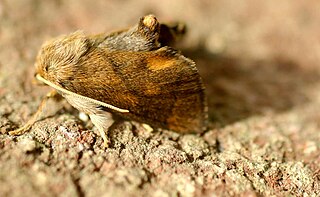
The Limacodidae or Eucleidae are a family of moths in the superfamily Zygaenoidea or the Cossoidea; the placement is in dispute. They are often called slug moths because their caterpillars bear a distinct resemblance to slugs. They are also called cup moths because of the shape of their cocoons.

Callidulidae, the only known family of the superfamily Calliduloidea, is the family of Old World butterfly-moths, containing eight genera. They have a peculiar distribution, restricted to the Old World tropics of Southeast Asia to Australasia and Madagascar. The three subfamilies exhibit both day- and night-flying behaviour.
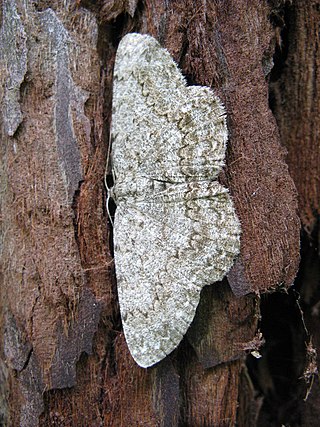
The Boarmiini are a large tribe of geometer moths in the Ennominae subfamily.
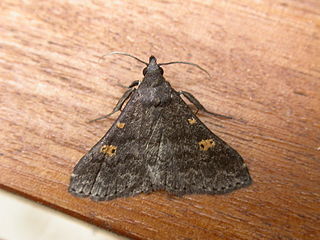
Naarda is a large genus of erebid moths currently encompassing 108 species. Initially identified by Francis Walker in 1866, it is in the family Erebidae. Somewhat ruddy in appearance, this genus is distinguishable for its generally slender thorax and abdomen, and straight, porrect labial palpi. Most species are a light tan color, but shading can reach as deep as a charcoal, with muddy yellow, conspicuous reniform, orbicular stigmata featured on the forewings, sometimes reflected bilaterally superior.
Mantala is a monotypic moth genus in the subfamily Arctiinae. Its single species, Mantala tineoides, is found on Borneo. Both the genus and the species were first described by Francis Walker in 1862. The habitat consists of lowland and lower montane forests.

Ugia is a genus of moths in the family Erebidae erected by Francis Walker in 1858.
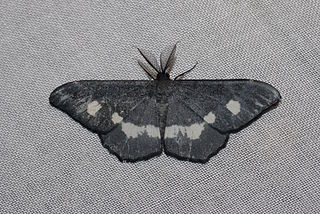
Hyposidra is a genus of moths in the family Geometridae first described by Achille Guenée in 1857.

Hyposidra picaria is a geometer moth in the Ennominae subfamily first described by Francis Walker in 1866. It is found throughout Sundaland.
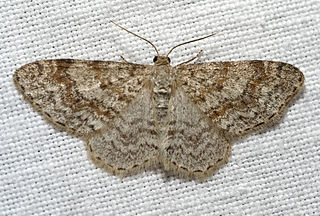
Asthenini is a tribe of geometer moths under subfamily Larentiinae first described by Warren in 1893. The tribe has been combined with Eupitheciini in the past, most notably by Jeremy Daniel Holloway in his work The Moths of Borneo.

Lymantriini is a tribe of moths of the family Erebidae. This tribe is a group of polyphagous moths that reside mostly in the tropical regions of Afro-Eurasia but also North America.
The Catephiini are a tribe of moths in the family Erebidae.

Hyposidra talaca, the black looper or black inch worm, is a moth of the family Geometridae. The species was first described by Francis Walker in 1860. It is found from India to Indochina, Sundaland, Sulawesi, the Philippines, Sri Lanka, the Solomon Islands, Thailand, Taiwan, New Guinea and Australia, where it has been recorded from Queensland. It is a major defoliating pest in tea plantations.

Hyposidra violescens is a geometer moth in the Ennominae subfamily. It is found in Northwestern Himalaya, Northern Vietnam, Northern Thailand, Peninsular Malaysia, Sumatra, and Borneo. The species is infrequent in lowlands and lower montane forests.

Hyposidra aquilaria is a geometer moth in the Ennominae subfamily. It is found in Northwestern Himalaya, Western, Southern and Eastern China, Peninsular Malaysia, Sumatra, and Borneo. It is a rare species of lowland forests.

Hyposidra infixaria is a geometer moth in the Ennominae subfamily. It is found in Northwestern Himalaya, Southern China, Taiwan and Sundaland, mainly in lowland forests. There is great variation in wing color, presence or absence of the subcostal line.















